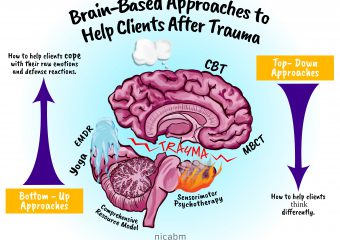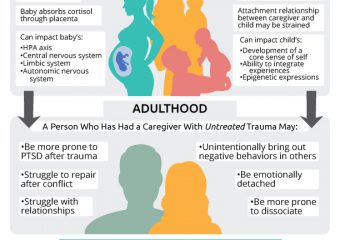Could Thanksgiving be the best night’s sleep you’ll get all year? According to research, the answer might be yes . . . . . . but it isn’t because of the turkey. You see, a pioneering study from 2009 looked at whether another Thanksgiving staple could have sleep benefits. I’m talking about gratitude. Alex Wood, […]
Treating Trauma in 125 Countries
Now that we’ve wrapped up the Treating Trauma Master Series, I’d like to take a moment to thank you again for tuning in. 51,850 practitioners joined us for one or more sessions of the program. We believe the work you do with people who’ve experienced trauma is so important. That’s why we made it our […]
Brain-Based Approaches to Help Clients After Trauma [Infographic]
After trauma, it can seem like the lower brain – the parts responsible for our emotional reactions and our defense system – has been severed from the upper thinking brain. This can leave clients feeling the heat of their emotions, but without insight or cognitive reflection. So when we think about treating trauma, our clinical […]
Is There a Factor That Can Predict PTSD Development in War Veterans?
In a conversation about PTSD, my colleague, Pat Ogden, PhD told me that many of her clients struggling with PTSD also had insecure attachments. Often, these clients were veterans whose insecure attachments predisposed them to develop PTSD after combat. This conversation got me wondering whether there were other predictors of PTSD aside from insecure attachment. […]
How a Caregiver’s Trauma Can Impact a Child’s Development [Infographic]
When someone experiences trauma, its physical and emotional effects can sometimes impact their children – and the impact of trauma on child development can begin in utero. You see, during times of stress, the body releases the hormone cortisol. As you may know, that’s one of the ways our body helps us cope with physically or emotionally difficult situations. But […]
How Might Epigenetics Influence the Link between PTSD and Inflammation?
Is there a link between PTSD and our body’s immune response? Well, research published in the Journal of Brain, Behavior, and Immunity has stretched beyond focusing on what happens to the body’s nervous and endocrine systems after trauma. . . . . . and researchers have discovered a connection between trauma and the body’s immune […]
One Common Mistake Practitioners Make That Can Heighten a Client’s Shame
Working with a client who struggles with deep feelings of shame can often be a delicate and nuanced process . . . . . . and according to Peter Levine, PhD, there’s one mistake practitioners sometimes make that can send clients even further into shameful feelings. Here, Peter will share what that mistake is – […]
A Creative Technique to Help Clients Face Fear
Fear is our body’s natural way of protecting us from a potential threat. But when fear gets in the driver’s seat, it can keep us from the people and activities we value most. So how can we help our clients take back control from their fears? In the video below, Lynn Lyons, LICSW explains a […]
How to Reframe a Client’s Relationship with an Inner Critic
A toxic inner critic can often trap our clients in painful patterns of shame, or sometimes leave them frozen in fear. But according to Rick Hanson, PhD, the inner critic can also serve an important function. So how can we help clients counteract a harsh inner critic in order to experience healing and growth? In […]
When Depression Doesn’t Look Like Depression
Fatigue. Feelings of worthlessness. Loss of interest. We recognize these as classic signs of depression. But according to Terry Real, MSW, LICSW, these symptoms aren’t always the way men experience depression. So how do we help clients when their depression doesn’t necessarily look like depression? In this short video, Terry shares a two-pronged approach to […]









